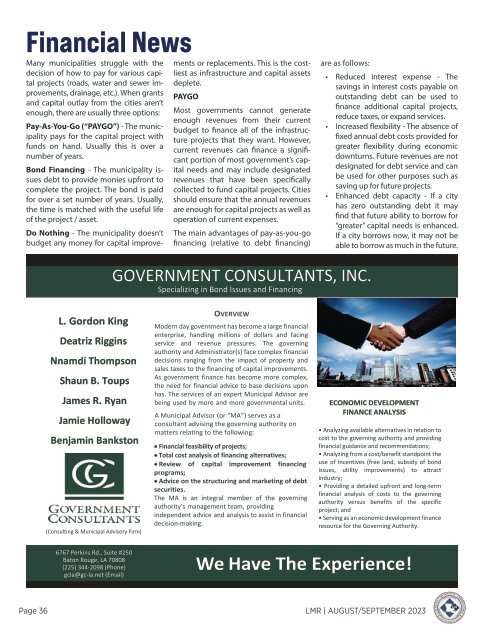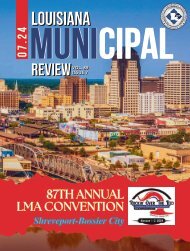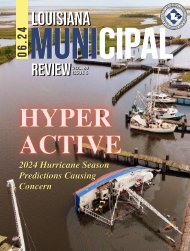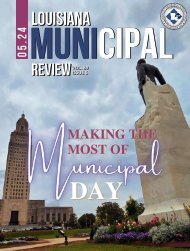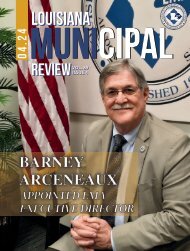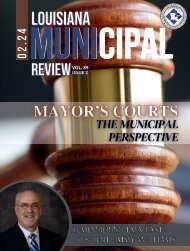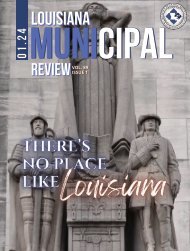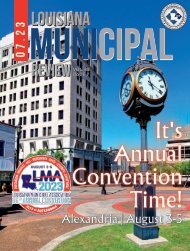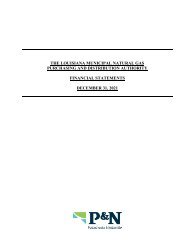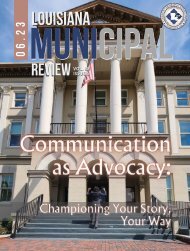August/September 2023
Create successful ePaper yourself
Turn your PDF publications into a flip-book with our unique Google optimized e-Paper software.
Financial News<br />
Many municipalities struggle with the<br />
decision of how to pay for various capital<br />
projects (roads, water and sewer improvements,<br />
drainage, etc.). When grants<br />
and capital outlay from the cities aren’t<br />
enough, there are usually three options:<br />
Pay-As-You-Go (“PAYGO”) - The municipality<br />
pays for the capital project with<br />
funds on hand. Usually this is over a<br />
number of years.<br />
Bond Financing - The municipality issues<br />
debt to provide monies upfront to<br />
complete the project. The bond is paid<br />
for over a set number of years. Usually,<br />
the time is matched with the useful life<br />
of the project / asset.<br />
Do Nothing - The municipality doesn’t<br />
budget any money for capital improvements<br />
or replacements. This is the costliest<br />
as infrastructure and capital assets<br />
deplete.<br />
PAYGO<br />
Most governments cannot generate<br />
enough revenues from their current<br />
budget to finance all of the infrastructure<br />
projects that they want. However,<br />
current revenues can finance a significant<br />
portion of most government’s capital<br />
needs and may include designated<br />
revenues that have been specifically<br />
collected to fund capital projects. Cities<br />
should ensure that the annual revenues<br />
are enough for capital projects as well as<br />
operation of current expenses.<br />
The main advantages of pay-as-you-go<br />
financing (relative to debt financing)<br />
are as follows:<br />
• Reduced interest expense - The<br />
savings in interest costs payable on<br />
outstanding debt can be used to<br />
finance additional capital projects,<br />
reduce taxes, or expand services.<br />
• Increased flexibility - The absence of<br />
fixed annual debt costs provided for<br />
greater flexibility during economic<br />
downturns. Future revenues are not<br />
designated for debt service and can<br />
be used for other purposes such as<br />
saving up for future projects.<br />
• Enhanced debt capacity - If a city<br />
has zero outstanding debt it may<br />
find that future ability to borrow for<br />
“greater” capital needs is enhanced.<br />
If a city borrows now, it may not be<br />
able to borrow as much in the future.<br />
GOVERNMENT CONSULTANTS, INC.<br />
Specializing in Bond Issues and Financing<br />
L. Gordon King<br />
Deatriz Riggins<br />
Nnamdi Thompson<br />
Shaun B. Toups<br />
James R. Ryan<br />
Jamie Holloway<br />
Benjamin Bankston<br />
(Consulting & Municipal Advisory Firm)<br />
OVERVIEW<br />
Modern day government has become a large financial<br />
enterprise, handling millions of dollars and facing<br />
service and revenue pressures. The governing<br />
authority and Administrator(s) face complex financial<br />
decisions ranging from the impact of property and<br />
sales taxes to the financing of capital improvements.<br />
As government finance has become more complex,<br />
the need for financial advice to base decisions upon<br />
has. The services of an expert Municipal Advisor are<br />
being used by more and more governmental units.<br />
A Municipal Advisor (or “MA”) serves as a<br />
consultant advising the governing authority on<br />
matters relating to the following:<br />
• Financial feasibility of projects;<br />
• Total cost analysis of financing alternatives;<br />
• Review of capital improvement financing<br />
programs;<br />
• Advice on the structuring and marketing of debt<br />
securities.<br />
The MA is an integral member of the governing<br />
authority’s management team, providing<br />
independent advice and analysis to assist in financial<br />
decision-making.<br />
ECONOMIC DEVELOPMENT<br />
FINANCE ANALYSIS<br />
• Analyzing available alternatives in relation to<br />
cost to the governing authority and providing<br />
financial guidance and recommendations;<br />
• Analyzing from a cost/benefit standpoint the<br />
use of incentives (free land, subsidy of bond<br />
issues, utility improvements) to attract<br />
industry;<br />
• Providing a detailed upfront and long-term<br />
financial analysis of costs to the governing<br />
authority versus benefits of the specific<br />
project; and<br />
• Serving as an economic development finance<br />
resource for the Governing Authority.<br />
6767 Perkins Rd., Suite #250<br />
Baton Rouge, LA 70808<br />
(225) 344-2098 (Phone)<br />
gcla@gc-la.net (Email)<br />
We Have The Experience!<br />
Page 36<br />
LMR | AUGUST/SEPTEMBER <strong>2023</strong>


